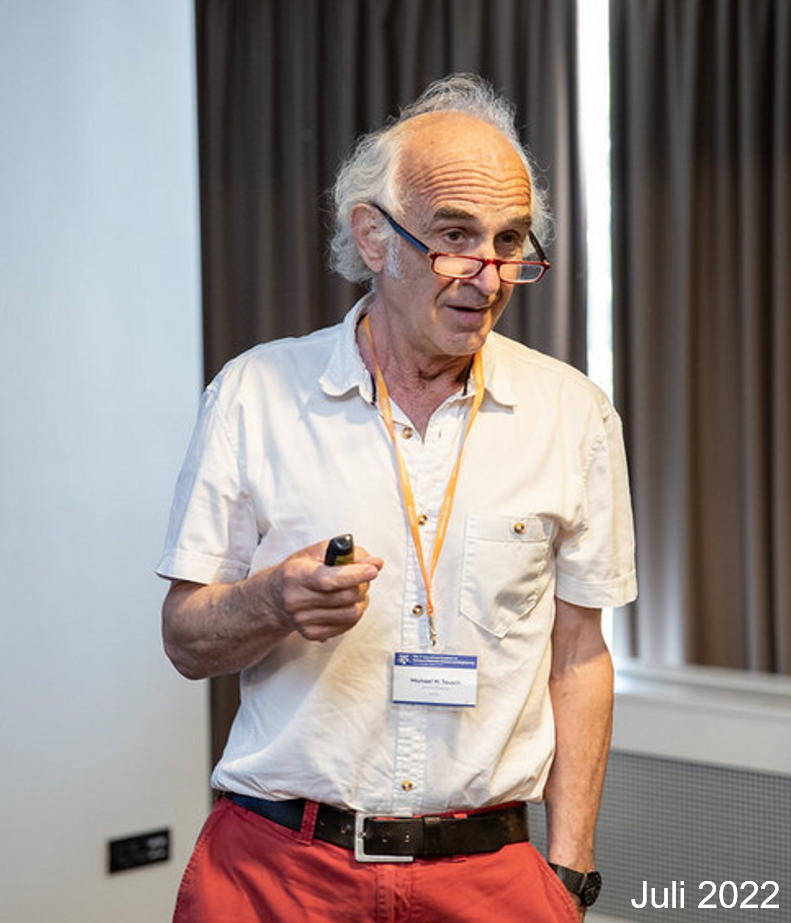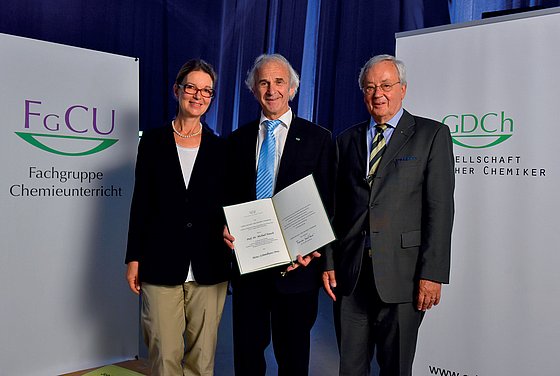Sen. Prof. Michael W. Tausch
Tabular Curriculum Vitae
| 11.08.1949 | Born in Sighisoara, Transylvania (Romania) |
| 1949 – 1967 | Transylvania: Childhood, school, high-school graduation (1967) |
| 1967 – 1972 | Bucharest: Studies, diploma in chemistry at the Polytechnic University of Bucharest (1972), research assistant and doctoral student at the Institute for Organic Chemistry Bucharest. |
| 1976 – 1996 | Teacher for chemistry and mathematics at the Cooperative Comprehensive School Weyhe, doctorate (Dr. rer. nat.) at the University of Bremen (1981), member of the curriculum commissions for chemistry at the Ministry of Education Hanover, lecturer and leader of GDCh teacher training courses. |
| 1996 – 2005 | Professor (C3) of Chemistry and Chemistry Didactics at the Gerhard Mercator University of Duisburg. |
| since 2005 | Professor (W3) of Chemistry and Chemistry Didactics at the Bergische Universität Wuppertal; retired in 2018, Senior Professor of Curricular Innovation in Photochemistry, Research in DFG-projects |

Professional Hotspots
-
As a PhD student at the Institute of Organic Chemistry Bucharest, he has researched the thermal and photochemical valence isomerisations in tribenzo-[12]-annulenes and their derivatives.
-
Since moving to Germany, one of his main permanent interests has been the development of experiments that allow young people to discover the fascination of chemistry in an exciting, playful way.
-
As a teacher and professor, he has integrated the newly developed experiments into articles, school and textbooks as well as into diverse electronic media (cf. publications).
-
Chemistry with light is the main topic of his research. He has been communicating the results since 1987 in teacher training courses as well as in experimental lectures, workshops and guest professorships at home and abroad (cf. below).
Publications
276 publications (as of June, 2022): Articles in Journals in GERMAN and ENGLISH, and textbooks
Chemistry with light!—Central demand in the 21st century
Convinced that light will become the most important form of sustainable energy in the 21st century, Michael Tausch considers it absolutely essential to integrate as soon as possible physical, chemical and biological processes involving light into the science education in schools and universities. In order to support and accelerate this transformation, he provides on the Internet platform https://chemiemitlicht.uni-wuppertal.de/en/ extensive teaching/learning materials as well as didactic tips for integrating photoprocesses into school lessons and teacher training in the sections "Experiments", "Movies and Videos", "Models and Animations", "Experimental Kits and Material Sets", "Teaching Modules", etc. The materials on the platform can be triggered in GERMAN as well as in ENGLISH. Doing so, he wants to convey science for future that provides solutions for what is demonstrated at the fridays for future. It enables a sustainable, climate-neutral and environmentally friendly future of our technical civilization.
Teaching videos and movies
Teaching videos and movies with actors, experiments, dialogues and explanations in ENGLISH available on https://chemiemitlicht.uni-wuppertal.de/en/movies-videos/ (selection)
- What is a photon? – particle-wave duality
- Underground-Minigolf – Color by light emission
- ON and OFF with light – a photoactive molecular switch
- A chemical chameleon – molecular environment and solvatochromism
- Unequal equilibria – thermodynamic equilibrium vs. photosteady state
- Photosynthese, ein Fall für zwei (Teil 1) – Photo-Blue-Bottle, Modellexperimente für den C-Kreislauf in der Biosphäre
- Photosynthese, ein Fall für zwei (Teil 2) – ß-Carotin als Photosensibilisator und -protektor für Chlorophyll
- Photosynthesis - a case for two (part 1) – Photo-Blue-Bottle experiment for the simulation of the carbon cycle in the biosphere
- Photosynthesis - a case for two (part 2) – experiments concerning the interaction of chlorophyll and beta-carotene in the photosynthesis
Guest professorships, workshops, invited experimental lectures
- Germany (Wuppertal, Berlin, Hamburg, Cologne, Düsseldorf, Konstanz, Freiburg, Göttingen, Trier, Speyer, Stuttgart, Hannover, München, Bremen, Kiel, Münster u. a.)
- Austria (Vienna, Salzburg, Linz, Graz, Eisenstadt, Feldkirch, Leoben, Klagenfurt u. a.)
- Switzerland (Zürich, Bern, Luzern, Chur, Fribourg, Biel/Bienne, Thun, St. Gallen u. a.)
- Mexico (Mexico City, Univ. Iberoamericana)
- Argentinia (Buenos Aires)
- Peru (Lima)
- Australia (Melbourne und Sydney)
- South africa (Cape Town und Potcheftsroom)
- Mauritius (Pointe aux Piment)
- Indonesia (Bandung und Surakarta)
- USA (Miami)
- Israel (Tel Aviv)
- India (Bangalore)
- China (Kunming)
- Singapur
- France (Bordeaux)
- Luxemburg
- Liechtenstein (Vaduz)
- Spain (Valencia und Huelva)
- Italy (Bologna)
- Hungary (Budapest)
- Czechia (Prag)
- Romania (Bukarest und Brasov)
- Russia (St. Petersburg)
- Sweden (Jävele)
- Turkey (Istanbul)
- Bulgaria (Burgas)
- Croatia (Opatja)
Memberships
- German Chemical Society GDCh, Division of Chemistry Education and FG Photochemistry.
- European Photochemistry Association EPA
- Association of Chemistry Teachers in Austria VCÖ
- Association for the Promotion of Mathematics and Science Education MNU
- Society of German Natural Scientists and Physicians GDNÄ
Awards

-
Prize for Experimental Lectures of the Association for the Promotion of Mathematics and Science Education MNU (Bremerhaven, 1990).
-
Friedrich Stromeyer Prize for Chemistry Teachers of the Group for Chemistry Education of the Gesellschaft Deutscher Chemiker GDCh (Halle, 1994)
-
Science Prize of the J.J.Becher-Foundation (Speyer, 2007)
-
Knowledge Transfer Special Prize of the Society of Friends of the University of Wuppertal (Wuppertal, 2013)
-
Heinz-Schmidkunz Prize for Chemistry Didactics of the Gesellschaft Deutscher Chemiker GDCh (Dresden, 2015)
